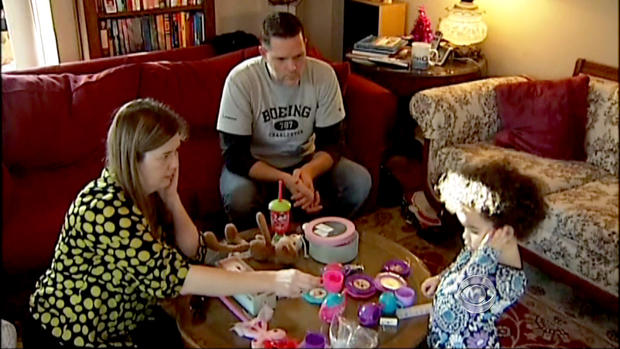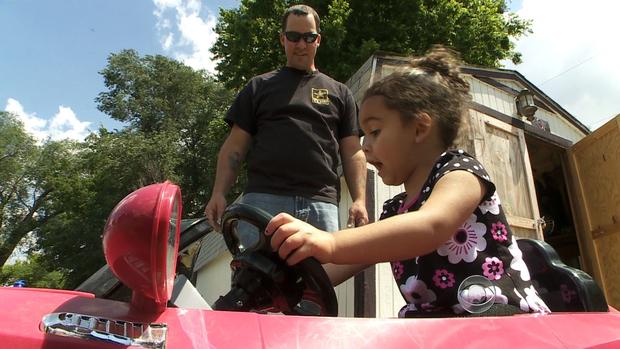Cherokee Indian girl's father faces charges in adoption dispute
The biological father of a 3-year-old Cherokee Indian girl faces arrest in a custody dispute that reached the U.S. Supreme Court.
Dusten Brown, who is a Cherokee and has been training with the National Guard in Iowa, had been ordered to turn over his daughter, Veronica, to a South Carolina adoptive couple who had initially raised the girl.
An arrest warrant has been issued on a charge of custodial interference because has failed to do so.
The case goes back to 2009, when Veronica was born. Matt and Melanie Capobianco were present at her birth and brought her home, believing they could adopt her from her unmarried biological mother, Chrissy Maldonado.
Before Brown's National Guard unit went to Iraq, he had sent Maldonado a text message that said "i will just sign my rites (sic) away." He also signed paperwork surrendering his parental rights.
"Before I deployed, I thought I was just signing the papers to her, you know, custody rights," Brown told CBS News correspondent Elaine Quijano last month. "I didn't think that I was signing, you know, giving up everything, you know, not wanting to have anything to do with my child. I mean that's my daughter."
When Brown found out about the adoption plans, he invoked a 1978 federal law - the Indian Child Welfare Act - that protects children of Native Americans from being separated from their families and tribes.
"They can't provide what my grandmother told me, and what I learned whenever I was growing up," Brown said. "They can't provide that."
A South Carolina court agreed and ordered custody of Veronica be given to Brown in 2011. She has lived with Brown and his wife in Oklahoma since then.
"She's full of energy," Brown said. "Always ready to do anything. Loves animals, loves mommy and daddy dearly."
But in June, the U.S. Supreme Court ruled 5-4 that the Indian Child Welfare Act did not apply in this case. Justice Samuel Alito wrote Brown "abandoned the Indian child before birth and never had custody of the child."
Saying yes in that text message and signing the paperwork before he left for Iraq "was one of the dumbest decisions that I've made," Brown said, but he insists he never abandoned his daughter.
The Supreme Court ordered the case back to the South Carolina court system. South Carolina Family Court Judge Daniel Martin finalized the Capobianco's adoption at the direction of the state supreme court earlier this month.
Cherokee Nation spokeswoman Amanda Clinton called the arrest warrant "morally reprehensible" and "legally questionable."
"The attorneys, the courts and the adoptive couple in this case were keenly aware of Dusten's [National Guard] commitment, but clearly chose to ignore it," Clinton said in a written statement. "This case is still not yet fully litigated. So to take these steps when there are pending legal actions in South Carolina, Oklahoma and Cherokee Nation courts is appalling."
"Not only is the adoptive couple asking this child be ripped from her father while he is serving our country, they are also endangering his military career in the process," Clinton said. "This is outrageous conduct."
The attorneys for Veronica's adoptive parents and her birth mother argued in a joint statement Sunday morning that not only is Brown committing a felony, but anyone who hides the child from law enforcement or stands in the way of the court order to turn her over — including the Cherokee Nation — also should be considered lawbreakers.
"It seems the lesson here is that Matt and Melanie Capobianco should have refused to turn Veronica over 19 months ago, and denounced it as outrageous that they were being forced to comply with a court order when they still had the entire appeals process before them. They did not do that, because they understood that they would be fugitives from justice if they resorted to ignoring the rule of law," the statement said.
The statement said the charge filed against Brown isn't surprising: "It is absolutely necessary to ensure that the rule of law is followed and a little girl is returned to her parents."
Brown was cleared Saturday night to return from Iowa to Oklahoma so he could attend a hearing in the case, a Guard spokesman said.
Brown was attending a military training school at Camp Dodge, a National Guard base in the Des Moines suburb of Johnston. Iowa National Guard spokesman Col. Greg Hapgood said Brown had been living in barracks at the camp, as is typical for people receiving training.
Brown and others had been given a two-day pass to leave the camp Friday and Saturday. He was supposed to report back Sunday, but that changed when the Oklahoma National Guard freed him from his training orders Saturday night and required he return to Oklahoma, officials said.
Meanwhile, Maldonado, the girl's biological mother, is pursuing a lawsuit against the federal government, arguing that the Indian Child Welfare Act is unconstitutional on the basis that it uses race to determine custody in violation of equal-protection laws.
Several American Indian groups are pursuing a federal civil rights case, arguing for a hearing to determine if the adoption is in Veronica's best interest.

